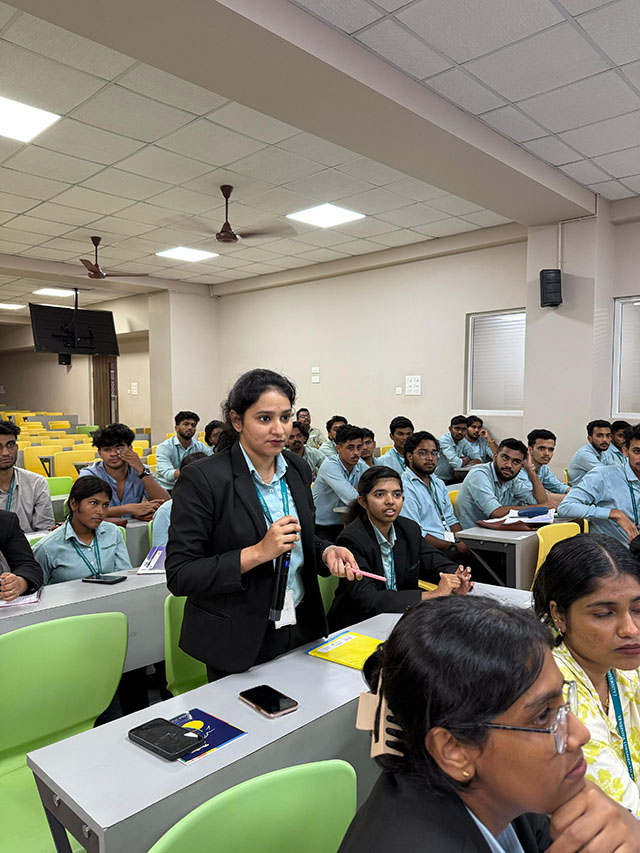Media Release
Mangaluru, Jun 3: The Department of MBA at Yenepoya Institute of Arts, Science, Commerce & Management (YIASCM), Yenepoya (Deemed to be University), Mangaluru organized an expert talk on “Port operations & terminal management” as part of its ongoing efforts to bridge academic learning with industry exposure. The event took place on the May 30, and aimed to provide students with in-depth knowledge of the intricacies of port management, terminal operations, and the maritime sector as a whole.
The event commenced with a warm welcome address by Neha A K, a second-semester MBA student. Neha introduced the guest speaker, Santhosh A D’Souza, providing attendees with an overview of his extensive professional journey in the maritime industry. Her introduction set a solid foundation for what turned out to be an insightful and highly engaging session.
















D’Souza, currently serving as master (FG), MNI at GENCO - synergy ship management, brought a wealth of hands-on experience from the global shipping industry. With a professional career spanning over a decade, he is well-versed in maritime operations, including port management, shipping logistics, and terminal operations.
The session provided a detailed explanation of port operations, emphasizing their strategic importance in global trade. D’Souza outlined the different types of ports—commercial, cargo, container, and multi-purpose—and explained how each function within the global supply chain. His explanation of terminal management was particularly relevant for students specializing in logistics & supply chain management. He elaborated on various operational functions within terminals, such as cargo handling, logistics coordination, warehousing, and the role of technology in enhancing operational efficiency.
D'Souza emphasized the importance of infrastructure—such as cranes, conveyors, and automated systems—in ensuring smooth and efficient operations. He also discussed innovative technologies like AI, IoT, and blockchain that are being integrated into port management systems to improve efficiency and reduce costs. The shift toward automation in ports, including automated container handling and digital tracking systems, was a key topic that captivated the students. According to D’Souza, these developments are revolutionizing the maritime logistics industry.
One of the most engaging parts of the session was D’Souza’s insights into career opportunities within the port and maritime sectors. He highlighted the vast and diverse job landscape in areas such as port management, logistics coordination, terminal operations, and supply chain optimization. Sharing personal anecdotes, he recounted how his global experiences shaped his professional journey.
In addition to job roles, D’Souza emphasized the essential skills for students aspiring to enter the maritime industry. He underscored the importance of soft skills such as communication, leadership, and problem-solving, alongside technical expertise. He advised students to strengthen interpersonal skills for managing teams in high-pressure environments like ports and terminals. Furthermore, he highlighted the rising importance of data analysis, supply chain modelling, and sustainability practices in port operations.
The session also featured an interactive Q&A segment, during which students actively engaged with D’Souza. A significant portion of the discussion focused on job opportunities in ports across the world. The speaker addressed queries about the international mobility of port-related jobs, the competitive nature of the industry, and the growing global demand for skilled professionals in port and terminal management.
He also guided students on how to enhance their employability by pursuing industry-recognized certifications. D’Souza recommended programs offered by institutions like the Indian Maritime University (IMU) and the International Maritime Organization (IMO), which can open doors to rewarding careers in the global shipping industry.
Additionally, he elaborated on upskilling through competitive exams related to port management, shipping, and logistics. He mentioned several government and private sector exams—such as IMU entrance exams, maritime regulatory exams, and specialized training programs—that students can explore.
Prof Niyaz Panakaje, coordinator of the MBA programme and the Yenepoya Research Centre for Finance and Entrepreneurship Development (YEN-REFINED), commended the session as a valuable learning experience for students. In his remarks, he expressed sincere appreciation for Mr. Dsouza’s thought-provoking and insightful presentation. Prof Panakaje emphasized the importance of connecting academic knowledge with practical industry exposure and highlighted how such sessions are instrumental in preparing students for the evolving demands of the professional world. He reiterated that industry-academic collaborations deepen students' understanding of real-world challenges, particularly in logistics and maritime management. The session was seamlessly coordinated by Akash S, associate professor, & Rajesh, assistant professor, department of MBA, YIASCM
The event concluded with a heartfelt vote of thanks delivered by Prathiksha Shetty, a second-semester MBA student. She expressed her gratitude to D’Souza for sharing his invaluable knowledge and expertise, and extended thanks to the organizing committee, faculty members, and all participants for contributing to the success of the event.